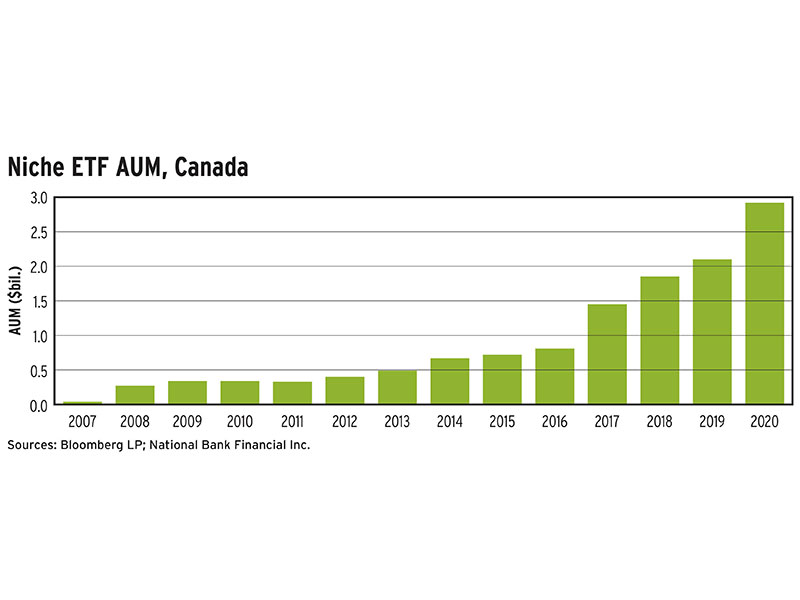
This article appears in the March 2021 issue of Investment Executive. Subscribe to the print edition, read the digital edition or read the articles online.
As retail investors look to capitalize on the post-pandemic recovery, Canadian ETF providers are launching niche ETFs focused on sectors as varied as biotechnology, clean energy and cryptocurrency.
Market conditions have caused an “explosion” of interest in niche and thematic ETFs, said Daniel Straus, director of ETF strategy and research with National Bank Financial Inc. in Toronto.
“The investment industry is never going to miss an opportunity to profit from a demand in the marketplace,” said Alan Fustey, portfolio manager and ETF strategist with Oakville, Ont.-based Bellwether Investment Management Inc. in Winnipeg.
Case in point: the Harvest Travel & Leisure Index ETF (TSX: TRVL) from Oakville, Ont.-based Harvest Portfolio Group Inc., which launched in January and surpassed $100 million in assets under management in early March. This unhedged ETF, which carries a 40-basis-point management expense ratio and is available in a U.S.-dollar version, tracks the performance of the Solactive Travel & Leisure Index and invests in 30 large-cap airlines, cruise lines, hotels, resorts, casinos and travel-booking companies that trade on North American exchanges.
TRVL gives investors the opportunity to take advantage of long-term demographic trends that favour the tourism sector, said Michael Kovacs, president and CEO of Harvest, while playing the “short-term consumer discretionary recovery” as lockdown restrictions lift.
Kovacs estimated that Covid-19 reduced valuations for some travel companies by 80%–90%. Harvest had been considering the ETF before the pandemic hit: “As the dust cleared, we could see there was a great opportunity to launch the fund.”
Harvest, which also launched a clean energy ETF in January, has “a couple of more thematic-type ideas that we will probably be launching this year,” Kovacs said. “We want to bring out ideas that have long-term growth characteristics.”
Niche and thematic ETFs typically focus on sectors within sectors — for example, artificial intelligence as a subsector of technology — or on an investing theme that crosses multiple sectors. An example of the latter is the iShares Global Water Index ETF, which launched in 2007 and includes positions in utilities and tech companies with water-related operations.
While niche ETFs have been around for more than 15 years in the U.S., their popularity in the U.S. and Canada took off about five years ago (see chart, left), when funds focused on emerging technology such as cybersecurity, robotics and animation began to draw in a flood of assets, Straus said: “That prompted a whole cavalcade of new niche and thematic ETFs in the hopes of finding the next big hit.” Today, niche and thematic ETFs are “a major part of the ETF landscape,” he said, attracting investors seeking “really, really growthy action.”
Some investors have been drawn to niche ETFs that focus on environmental, social and governance (ESG) themes, a wide-ranging category that can encompass everything from gender diversity to renewable technology.
These products “are not just pure investment-driven [plays],” Fustey said. “Someone is trying to make a social point with what they’re doing with their investments.”
Mary Hagerman, portfolio manager with Raymond James Ltd. in Montreal, incorporates niche ETFs in client portfolios as “satellite” rather than core positions if she feels there is longer-term potential within a sector, such as in ESG. She doesn’t favour niche ETFs that appear to be short-term investment plays. Instead, she looks for subsectors set to outperform their broader sectors, which themselves are set to outperform the overall market. “Otherwise, why add that risk to your portfolio?” Hagerman said.
Some niche ETFs merely offer a “potpourri” of stocks the investor already owns, Straus cautioned. For example, an infrastructure niche ETF that holds positions in large-cap companies may provide an “overlapping or doubling up” on stocks held as a core position.
A niche ETF in, say, space exploration, on the other hand, may provide exposure to small- or mid-cap names that aren’t already in a portfolio as well as the potential for higher returns, Straus said.
Click image for full-size chart
